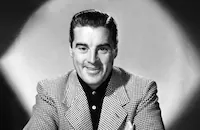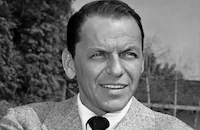Las Vegas Nights--"The Last Frontier Town"
Brief Synopsis
Cast & Crew
Ralph Murphy
Constance Moore
Bert Wheeler
Phil Regan
Lillian Cornell
Virginia Dale
Film Details
Technical Specs

Synopsis
The Jennings Sisters, a nightclub act consisting of Norma, Mildred and Patsy, and Patsy's husband, vaudeville performer Stu Grant, are arrested in Las Vegas for bringing pigeons into the state without a permit. The judge, whose easygoing nature reflects the nature of the town, lets the group off without a fine when they perform for him. At a casino featuring Tommy Dorsey and His Orchestra, Bill Stevens, a transplanted Californian who runs his father's ranch, seeks a kiss from a stranger to bring him good luck with a slot machine and kisses Norma. The kiss does bring him luck and the pair spend the evening together winning at every game they play. The next morning Norma gives Stu her $1,500 winnings to deposit into the bank, but he loses it gambling. Stu does not tell the sisters about the money and together they meet with Hank Bevis, the oily young lawyer who represented them in court, and who is handling their uncle's estate. The sisters inspect the ramshackled property that represents their inheritance and decide to use their $1,500 to open their own nightclub. Unknown to them, Hank is working with Bill's father to buy the property and develop the entire block as a hotel. Stu borrows money from Hank, who also runs a loan and furniture sales operation, to set up the new nightclub, but Hank hires thugs to destroy their business on opening night. The nightclub is nearly ruined by the brawl, and the sisters learn of their regrettable loan from Hank. Bill intervenes and gets them an audition with Tommy Dorsey on audition night at the casino, but Hank disrupts Patsy's pigeon act and causes the pigeons to fly away and terrorize the audience. The next morning, Bill tells the sisters that he has wired Los Angeles for the $1,500 to repay Hank, and Norma insists that he take their property as collateral. Tommy Dorsey hires the surprised sisters and gives them a $1,500 advance. They use this money to pay off Hank, who tells them that Bill has been using his romance with Norma as an underhanded way of getting their property. A telegram from Bill's father congratulating him on his purchase of their property seems to confirm Hank's assertion, but Bill vows innocence and calls his father. Bill learns of his father's plans and, out of loyalty to the Jennings, attempts to derail him by telling him that another company has made a bid on the property. That night the group performs with the Dorsey orchestra while Bill haggles with Hank over the property. Bill's father appears unexpectedly and Bill outwits his father by claiming the competitor has offered them $47,000. They finalize the sale at $46,000 and as Bill hugs Norma, he assures his father that the property will remain in the family.

Director
Ralph Murphy
Cast
Constance Moore

Bert Wheeler

Phil Regan
Lillian Cornell

Virginia Dale
Hank Ladd
Betty Brewer

Henry Kolker
Francetta Malloy
Red Donahue
"uno"
Tommy Dorsey

Frank Sinatra
Ziggy Elman

Eddie Kane
Nick Moro
Frank Yaconelli
Earle Douglas
Earle Hodgins
Jan Duggan
Phil Tead
Lee Moore
Jack Mulhall
Joseph J. Greene
Charles Wilson
Stanley Andrews
Pat West
Bob Perry
John Sheehan

Richard Carle
Charles B. Smith
Allen Pomeroy
Chick Collins
James Dundee
Fred Graham
Buddy Kelley
William Hall
Frank Wayne
Eleanor Stewart
Catherine Craig
Marcelle Christopher
Ella Neal
Jean Phillips

Wanda Mckay
Peggy Page
Carl Andre
Ralph Sanford
Victor Potel
Crew
Louis Alter
Harry Clork
Hans Dreier
Al Dubin
Arthur Franklin
Earl Hedrick
Victor Jacobi
William Lebaron
William Lebaron
Harold Lewis
Frank Loesser
Ruth Lowe
William C. Mellor
Walter Oberst
Ernest Pagano
Leroy Prinz
Clifford Roth
Edward Salven
Arthur Schmidt
Harry Warren
Eddie Welch
Victor Young

Film Details
Technical Specs

Award Nominations
Best Song
Articles
Las Vegas Nights
It was also Dorsey's feature debut, and without his band, the movie would barely be worth a mention. The New York Times called it "utterly lacking in snap" but also said, "on account of Tommy Dorsey and his band being hopefully but vainly involved, there may be some mild jitterbugging interest."
The review didn't even mention Sinatra, which is understandable since he wasn't yet a superstar and actually appears only fleetingly (and uncredited) in the movie, crooning "I'll Never Smile Again" with Dorsey's female singing group, the Pied Pipers. In fact, the movie only lets us hear part of the song.
The song, however, had already become a major hit with the public. Written by Ruth Lowe, it was recorded by Dorsey and Sinatra in November 1939 and released in January 1940. It reached #1 on the charts on July 27 and stayed there until October 19. It was not only one of Sinatra's first big hits with Dorsey's band, it was a career milestone, and he received more publicity than he ever had before. When the sheet music went on sale, it was Sinatra's likeness and name that commanded the cover, with the Pied Pipers relegated to the background.
When Dorsey's band performed in public, young bobbysoxers would call out for "I'll Never Smile Again," and then they'd sway on the floor and kiss while Sinatra gave them what they wanted to hear: "I'll never smile again, until I smile at you..."
The band was playing an engagement at L.A.'s Palladium when they were hired by Paramount to do Las Vegas Nights; Sinatra got $15 a day for his troubles. His biographer Anthony Summers has written that at this time, the married Sinatra "set himself up in a luxury suite, charging the bill to Dorsey, and installed in it a blonde actress, Alora Gooding." She was but one of many affairs. Dorsey later recalled witnessing the effect Sinatra had on women: "I used to stand there on the bandstand so amazed I'd almost forget to take my solos. You could feel the excitement coming out of the crowds when that kid stood up to sing. He was no matinee idol. He was a skinny kid with big ears. Yet what he did to women was something awful."
Other songs here include "Song of India," "I've Gotta Ride," and "Dolores," which was nominated for an Oscar®. (It lost to "The Last Time I Saw Paris" from Lady Be Good.) "Dolores" would later become a number-one hit for Sinatra and Dorsey, though it is performed here by vaudeville comic Bert Wheeler.
Legend has it that Bing Crosby visited the set when Sinatra sang his song, and afterwards said something to the effect of, "Real nice, Frank. You're going to go far."
Producer: William LeBaron
Director: Ralph Murphy
Screenplay: Harry Clork, Ernest Pagano, Eddie Welch (additional dialogue)
Cinematography: William C. Mellor
Art Direction: Hans Dreier, A. Earl Hedrick
Music: Louis Alter
Film Editing: Arthur P. Schmidt
Cast: Constance Moore (Norma Jennings), Bert Wheeler (Stu Grant), Phil Regan (Bill Stevens), Lillian Cornell (Mildred Jennings), Virginia Dale (Patsy Lynch), Hank Ladd (Hank Bevis), Betty Brewer (Katy), Henry Kolker (William Stevens, Sr.).
BW-110m.
by Jeremy Arnold

Las Vegas Nights
Quotes
Trivia
This musical was Frank Sinatra's movie debut. His appearance, singing "Dolores" with Tommy Dorsey's band, was uncredited.
Notes
According to a Hollywood Reporter news item, Richard Connell and Gladys Lehman were slated to write the original screenplay for this film, which was to star Allan Jones and Bert Wheeler. This film marked Tommy Dorsey's first appearance in a feature film, as well as the first screen appearance of Frank Sinatra, who was the featured singer with Dorsey's band at the time. News items also report that Esther Fernández, Teddy Hart and Ellen Drew were considered for roles in the film, and that a party scene was filmed on location in Las Vegas, NV. According to copyright records, Red Donahue and his mule started in vaudeville in 1912. The song "Dolores" was nominated for an Academy Award.














